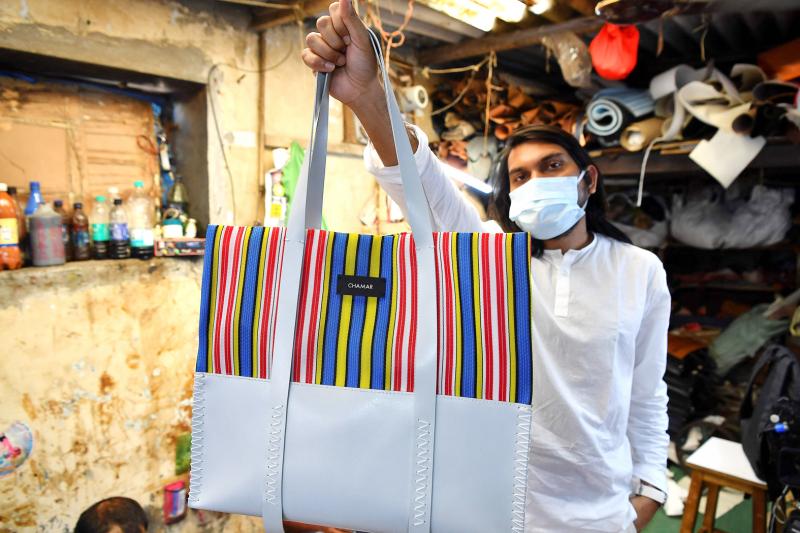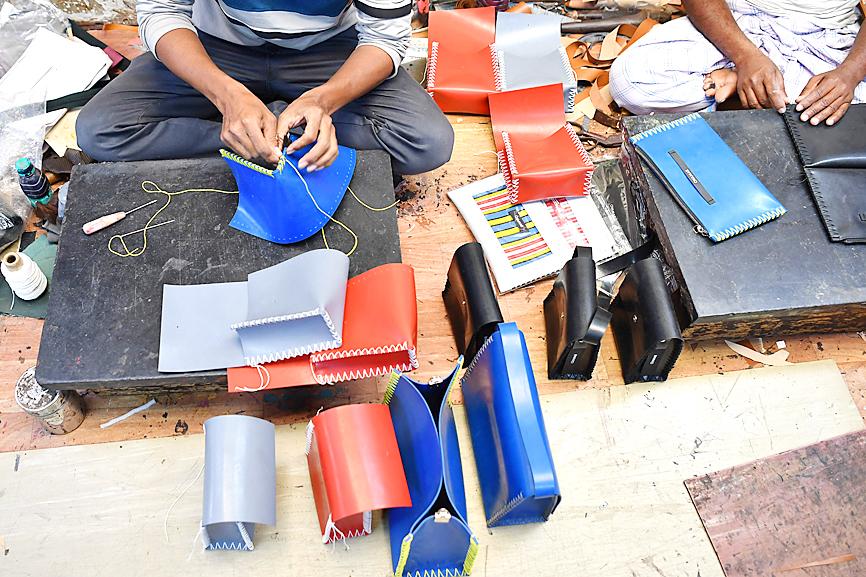The sound of men punching holes into colorful rubber sheets reverberates across a tiny studio in India’s largest slum — an unlikely birthplace for luxury handbags made by a marginalized community seeking to reclaim its identity.
Chamar Studio owes its name, derived from the Sanskrit word for “skin” and long used locally as a slur, to leather craftsmen who lie at the bottom of the Hindu caste hierarchy. As members of the Dalit caste, formerly known as untouchables, life has always been a struggle for India’s leather workers, who are largely Hindu Chamars or Muslim.
Then came Indian Prime Minister Narendra Modi’s war on beef consumption, which destroyed their livelihoods by cutting off access to raw materials. It also raised the threat of lynchings by so-called cow vigilantes — Hindu hardliners fighting to protect the animal they deem sacred.

Photo: AFP
“Chamars have been oppressed for so long,” Chamar Studio founder Sudheer Rajbhar said.
An artist by training, Rajbhar — who is lower-caste, although not Chamar — sought to offer the community a new lease on life by designing minimalist handbags made of recycled rubber — a sustainable substitute for leather.
First he had to weigh the legal risks, after India’s Supreme Court banned the “highly offensive word” in 2008 over its widespread use as a term of abuse. Then he had to convince the community, with many craftsmen fearing the potentially incendiary — and loss-making — implications of marketing a luxury product with lower-caste associations.

Photo: AFP
“I thought it was such a weird name for a brand,” said Rahul Gore, who faced discrimination while growing up in a village 300km from Mumbai.
“We were allowed to play with upper-caste children but their parents would not allow us to visit them at home or share food. I used to feel very bad about it,” 35-year-old Gore said.
The use of rubber instead of leather means that virtually every step — from the cutting to the stitching — needs to be performed by hand rather than with sewing machines.
The absence of tanning and the use of organic colors to dye the bags in the brand’s signature hues of cobalt blue, red and emerald green make the process much less toxic for workers, Rajbhar said.
The purses are so durable they can even withstand a spin in a washing machine, he added.
Rajbhar used his savings and bank loans to invest about 1 million rupees (US$13,757) into launching the brand in 2017, turning to local cobbler Sachin Sakhare for help in training craftsmen.
Sakhare started working on Mumbai’s crowded pavements as a 13-year-old when his father, also a cobbler, was killed in a hit-and-run accident.
He said that he wanted to “improve the lot of my people.”
“The caste system has created so much discrimination that people just don’t respect certain types of work,” said Sakhare, who used to earn 400 rupees a day as a cobbler.
The father-of-two now leads a team of Chamar and Muslim craftsmen making unisex totes, shoulder bags and clutches.
He said that his sense of self-worth has expanded, adding: “Now that I get more respect [for my work], I feel more like an artist.”
The purses do not come cheap, with prices ranging up to 39,000 rupees for an intricately woven oversized tote that takes a day to make.
However, customers have not balked at the cost, with the bags stocked at high-end boutiques in Mumbai and Frankfurt, as well as the brand’s own online store, but the company is confronting new challenges, with sales down since the COVID-19 outbreak began.
Many craftsmen remain fearful about returning to Mumbai, the Indian city hit hardest by COVID-19. Although Rajbhar’s Chamar Foundation has managed to support the families of his employees during India’s months-long lockdown, his colleagues worry about the future.
“Why would anyone buy handbags when they are worried about running their households?” said Sakhare, who also works as a sweeper to pay the bills.
Still, he refuses to give up hope.
“I never imagined we would make a difference to society,” he said. “It feels really good to tell the world that we are Chamar and we are artists.”

BYPASSING CHINA TARIFFS: In the first five months of this year, Foxconn sent US$4.4bn of iPhones to the US from India, compared with US$3.7bn in the whole of last year Nearly all the iPhones exported by Foxconn Technology Group (富士康科技集團) from India went to the US between March and last month, customs data showed, far above last year’s average of 50 percent and a clear sign of Apple Inc’s efforts to bypass high US tariffs imposed on China. The numbers, being reported by Reuters for the first time, show that Apple has realigned its India exports to almost exclusively serve the US market, when previously the devices were more widely distributed to nations including the Netherlands and the Czech Republic. During March to last month, Foxconn, known as Hon Hai Precision Industry

Taiwan Semiconductor Manufacturing Co (TSMC, 台積電) and the University of Tokyo (UTokyo) yesterday announced the launch of the TSMC-UTokyo Lab to promote advanced semiconductor research, education and talent development. The lab is TSMC’s first laboratory collaboration with a university outside Taiwan, the company said in a statement. The lab would leverage “the extensive knowledge, experience, and creativity” of both institutions, the company said. It is located in the Asano Section of UTokyo’s Hongo, Tokyo, campus and would be managed by UTokyo faculty, guided by directors from UTokyo and TSMC, the company said. TSMC began working with UTokyo in 2019, resulting in 21 research projects,

Taiwan’s property market is entering a freeze, with mortgage activity across the nation’s six largest cities plummeting in the first quarter, H&B Realty Co (住商不動產) said yesterday, citing mounting pressure on housing demand amid tighter lending rules and regulatory curbs. Mortgage applications in Taipei, New Taipei City, Taoyuan, Taichung, Tainan and Kaohsiung totaled 28,078 from January to March, a sharp 36.3 percent decline from 44,082 in the same period last year, the nation’s largest real-estate brokerage by franchise said, citing data from the Joint Credit Information Center (JCIC, 聯徵中心). “The simultaneous decline across all six cities reflects just how drastically the market

Ashton Hall’s morning routine involves dunking his head in iced Saratoga Spring Water. For the company that sells the bottled water — Hall’s brand of choice for drinking, brushing his teeth and submerging himself — that is fantastic news. “We’re so thankful to this incredible fitness influencer called Ashton Hall,” Saratoga owner Primo Brands Corp’s CEO Robbert Rietbroek said on an earnings call after Hall’s morning routine video went viral. “He really helped put our brand on the map.” Primo Brands, which was not affiliated with Hall when he made his video, is among the increasing number of companies benefiting from influencer